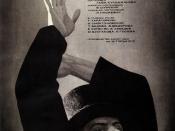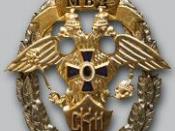"Laws are the conditions under which men, naturally independent, united themselves in society. Weary of living in a continual state of war, and of enjoying a liberty which became of little value, from the uncertainty of its duration, they sacrificed one part of it, to enjoy the rest in peace and security. The sum of all these portions of the liberty of each individual constituted the sovereignty of a nation..."-Cesare Baccaria "On Crimes and Punishment"The fundamental question is: Why do people stray from the societal norms and err on the side of the law? For those of common faith, crime or wrong-doing can be traced back as far as Adam eating the Forbidden Fruit, further inhibiting mankind to be bound to sin. Taoists believe in Yin and Yang, which, in part, says that evil lies in all of us. Even the greatest greatest thinkers of the Ancient Greek era had their philosophies - Aristotle blamed poverty, citing "Poverty is the parent of revolution and crime."
17th century Brit, Sir Francis Bacon sums it up clearest of all, "Opportunity makes a thief." Whichever your point of view, where persons gather and create a society, crime will take place. What you do with and about that crime is what gives rise societal control.
Cesare Baccaria has been deemed the father of the Classical Theory in criminology, and who's writings came from the 17th Century. His theory concludes that crime occurs when the benefits of a criminal act outweigh the costs, and when people pursue self-interests in the absence of effective punishments - that crime is indeed a free-willed choice. During this time of his report, the punishments for criminal acts were severe and extreme. Major crimes were punishable by death, minor crimes by whipping, chaining to the pillory, branding, or even having...


